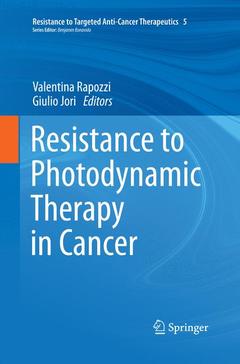Resistance to Photodynamic Therapy in Cancer, Softcover reprint of the original 1st ed. 2015 Resistance to Targeted Anti-Cancer Therapeutics Series, Vol. 5

Giulio Jori is Professor of Biophysics at the University of Padova, Italy. He has been a founding member and President of the European Society for Photobiology. His research interests are focused on basic mechanisms of photodynamic action at a cellular and tissue level, as well as investigations concerning the application of photodynamic therapy for the treatment of tumours and microbial infections. Dr. Jori is Editor-in-chief of Journal of Photochemistry and Photobiology and he was also chairman of the ownership board of the journal Photochemical and Photobiological Sciences. He has been the chief organizer of nine International Symposia on Photodynamic Therapy and Photodiagnosis in Clinical Practice. In addition, he has received an award for excellence in research from the European Society for Photobiology.
Valentina Rapozzi is a Researcher at the University of Udine, Italy. Dr. Rapozzi's research is focused on the antitumoral molecular pathways in photodynamic therapy. She is a member of the European Society for Photobiology, and a member of the Council of the Italian Society of Photobiology.
Date de parution : 10-2016
Ouvrage de 248 p.
15.5x23.5 cm
Date de parution : 04-2015
Ouvrage de 248 p.
15.5x23.5 cm



